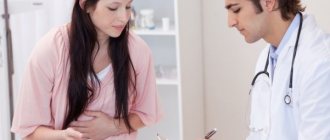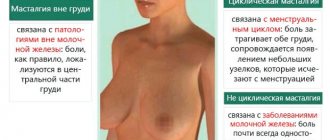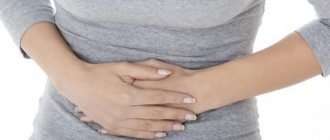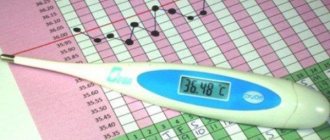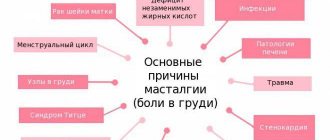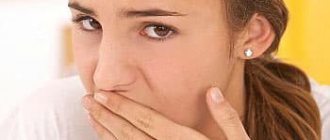Additional symptoms
First signs of pregnancy
If there are no periods at the beginning of the menstrual cycle, and breast tenderness is observed, the phenomenon is usually caused by changes in hormonal levels. In addition to pain, a woman may feel:
- chest swelling;
- increased body temperature;
- nausea and vomiting;
- pain in the lower abdomen.
In most cases, this is how pregnancy manifests itself in the early stages. If the test shows a negative result, you should contact a gynecologist for an accurate diagnosis.
Why did the pain suddenly disappear?
Discomfort in the mammary glands is unlikely to make anyone happy. On the other hand, this allows a woman to accurately determine when her period will come if her cycle is irregular. And yet many feel relief when they do not feel pain, and do not worry at all if they do not detect a symptom. To some extent, women are right, because a common and logical reason for the fact that the breasts have stopped swelling before menstruation, the discomfort has gone away, is the equalization of hormonal presence. This can happen after adolescence, when all processes in the body stabilize. Another sign is the regularity of critical days and their easier passage. The number of discharges comes to average figures, the duration of the discharge does not exceed 7 days.
Some people have to wait up to 25-30 years for such balance in the hormonal sphere. It occurs if a woman is close to a healthy lifestyle, she does without abortions, and is resistant to stress.
Sometimes it is discovered that only after childbirth the breasts stopped hurting before menstruation. Pregnancy, subsequent lactation, and the positive emotions experienced by a happy mother even out hormonal levels. But a certain vigilance is also needed here, since all circumstances can contribute to the occurrence of pathologies that provoke the absence of premenstrual discomfort in the mammary glands.
There are other reasons why before menstruation your breasts stop becoming full and painful:
| Cause of pain | Why is this happening |
| Beginning of regular sexual activity | This is important for a woman. And not just the presence of a permanent partner, but also the pleasure received from sex, as well as the absence of fears associated with intimate life. All this leads to normalization of hormone balance. |
| Pregnancy | Many will be surprised to receive this information, because in most people the mammary glands become sensitive to the point of pain. This is how they prepare for feeding the baby: the milk ducts expand, the volume of progesterone increases, which provokes edema, but is necessary during pregnancy. And yet, if your breasts stop hurting and there are no periods, this may be a sign that there will be an addition to the family. This is how changes characteristic of pregnancy appear in women who felt very noticeable discomfort in the mammary glands before menstruation. |
| Taking birth control pills | The imbalance of substances can be destroyed artificially, that is, by taking medications. Naturally, they are more often prescribed to avoid unwanted pregnancy. But hormonal contraceptives will also help with severe symptoms of PMS, including pain in the mammary glands. After all, most drugs contain estrogens and gestagens, which level out the general background. |
| Cure from mastopathy or its remission | Sometimes the PMS symptom in question is caused only by this pathology. And if the treatment helped get rid of the tumor or reduce it, it is not surprising that a week before your period your breasts stopped hurting. Indeed, with pathology, particular discomfort in the mammary glands was felt even on the “distant approaches” to critical days. |
Negative factors for the disappearance of premenstrual discomfort in the chest
It happens that the disappearance of heaviness and pain in the mammary glands is not caused by positive changes in the balance of hormones, but by pathologies and the influence of a negative state:
- Frozen pregnancy. Cessation of fetal development can occur at a very early stage. Naturally, the beginning of pregnancy causes an increase in the amount of progesterone, which causes pain. But then the volume of the hormone decreases, and since the undeveloping fetus is still in the uterus, rejection of its mucous membrane may not occur. A woman in this state feels like her breasts hurt, then stopped, and there is no menstruation.
- Ectopic pregnancy. The growth of the fertilized egg outside the organ cavity does not give a chance for the birth of a child. With its development, even at an early stage, a woman’s well-being changes. One of the signs is abdominal pain. But less than half of women feel discomfort in the mammary glands. Most people notice at an early stage that their breasts have stopped hurting and their periods have not come.
- Tumor disease of the reproductive organs. The correct balance of hormones means not only the required volume, but also the appropriate ratio of substances. If a tumor has formed in any part of the reproductive system that releases estrogens, progesterone no longer has the same effect on the body. This extends to the chest and during the period before menstruation. The mammary glands stop responding to cyclical hormonal fluctuations, and there are other disorders. Menstruation may be regular at first, but the sensations before and during your period become different.
- Polycystic ovary syndrome. With such a problem, menstrual function is generally disrupted. The balance of hormones also becomes different. In some women, an excess of androgens is observed, and the amount of progesterone, on the contrary, decreases. At first, this clearly does not make an impression either on appearance or on general well-being. But if a frequent symptom is a delay in menstruation, the breasts no longer hurt, it makes sense to examine the ovaries.
We recommend reading the article about nipple pain before menstruation. From it you will learn about the natural causes of discomfort in the chest before menstruation, diseases that cause pain, and discharge from the nipples before menstruation.
Probable Causes
Delay and chest pain can accompany serious disorders in the female body.
- Frozen pregnancy. The woman does not immediately notice that the fetus stops developing. Alarming symptoms appear on days 10-14. The breasts continue to grow, but the pregnancy test shows a false positive result. At the same time, bloody or brown discharge from the vagina begins, as the uterus tries to get rid of the foreign body on its own.
- Ectopic pregnancy. The fetus begins to develop in the fallopian tubes. This disorder does not occur often, but is manifested by a delay in menstruation and pain in the mammary glands. As the fetus grows, sharp pain in the lower abdomen, severe bleeding, fainting and malaise appear.
- Mastopathy. Affects one or two mammary glands. Changes appear in the tissues, so the chest begins to hurt. Delayed menstruation occurs due to hormonal imbalances. This pathology may appear due to addiction to bad habits.
- Mastitis. Appears in the initial stage of breastfeeding. Associated with increased production of the hormone prolactin in the body and insufficient pumping. Associated symptoms are breast swelling, hardening and hyperthermia.
- Inflammatory process in the ovaries or uterus. These include endometritis and adnexitis. They are often accompanied by false pregnancy and delayed menstrual cycle. Periodic aching pain in the abdomen is possible.
- Polycystic ovary syndrome. The appearance of numerous cysts is accompanied by severe hair loss, appearing on the chin and under the nose. This condition is characterized by obesity in the abdominal area.
- Galactorrhea or amenorrhea. A clear sign is the release of colostrum from the nipples. Aching pain in the lower abdomen and delayed menstruation appear. However, pregnancy tests are negative. This condition indicates the presence of pituitary microadenoma, hypothyroidism or tumors.
- Injuries. It is blows and accidental injuries that pose a serious danger to the female breast. They are often accompanied by the formation of cysts, compactions and hematomas. This is often reflected in the state of hormonal levels.
- Climate change. Moving from one region to another often affects the general condition of the body. It will take time for a person to adapt to new natural conditions. During this period, irregularities in the menstrual cycle may be a concern.
- Menopause begins in women after 40 years of age. Due to changes in the menstrual cycle, estrogen production decreases. Bloody discharge appears at unusual times and is less painful.
Taking contraceptives and surgical interventions may have some complications. This often causes endocrine diseases. As a result, women experience chest pain, delayed or disrupted menstrual cycles and other problems.
If the problem of delayed menstruation and swelling of the mammary glands does not disappear for a long time or appears every month, you need to contact a gynecologist and endocrinologist. A comprehensive examination may be ordered.
Why do my breasts hurt after menstruation?
Why do breasts hurt after menstruation is a question that worries many women. If your breasts still hurt after menstruation, then a woman should definitely pay attention to this point. After menstruation has passed, chest pain is allowed only in case of pregnancy. But if the possibility of fertilization is denied, then you should immediately go to the clinic.
The fact is that the mammary gland is the organ that is most often affected by oncology. Breast pain after your period may be a sign of cancer.
In order to diagnose this terrible disease or its prerequisites in time, you only need to undergo an examination. Of course, there may be less terrible reasons if your period is over and your chest hurts.
My period is over and my chest hurts: reasons:
- Heavy physical exertion on the thoracic region (so-called sore throat);
- Injuries associated with impacts (bruises, hematomas);
- Uncomfortable underwear that prevents normal blood circulation.
Video why chest hurts:
In any case, if a few days before your period the discomfort in the chest does not go away or your chest hurts during your period, then this is a clear sign of a deviation. Chest pain during menstruation is not considered normal.
The only normal condition for breast pain during menstruation is pregnancy. This is good news in a woman’s life, but even in this condition, you need to constantly undergo breast examinations from a doctor.
Diagnosis and treatment
One of the main methods of preliminary diagnosis is palpation
If your period does not come within 10 days, this is normal, since the cycle tends to shift. If more time has passed, you should take a pregnancy test. If the result is negative, you should seek medical diagnosis. It consists of several stages.
- Examination and palpation of the mammary glands by a mammologist. The specialist determines how much the tissue under the skin has changed and whether there are any seals.
- Visit to the gynecologist. The doctor examines the mucous membrane and assesses the condition of the uterus. Takes a swab for analysis.
- Ultrasound of the mammary glands and pelvic organs. With the help of this examination, it is possible to identify polycystic disease, tumor and other types of neoplasms.
- Mammography. It is carried out when a patient complains of pain and engorgement of the breast. The study shows the presence of nodes and adhesions in the mammary glands.
Laboratory tests are also ordered. They allow you to determine whether there is an inflammatory process in the body and how serious it is.
Ultrasound examination is recommended to be performed from 5 to 7 days of the menstrual cycle. During this period, it is possible to obtain accurate information about the condition of the mammary glands.
Treatment should begin only after receiving the results of all examinations and the conclusion of the attending physician.
Depending on the cause, therapy may vary. If the disease is associated with a hormonal imbalance, corrective medications are prescribed. The dosage should be determined by the doctor depending on the age and weight category of the patient. Medicines that relieve spasms and pain are also prescribed: No-shpa, Drotaverine, Spazmolgon, Nurofen. Tumors are usually removed surgically.
Why do my breasts hurt during menstruation?
Why do breasts hurt during menstruation is a question that worries many women. Is it normal or pathological for breast pain during menstruation? Chest pain during menstruation often frightens the fairer sex. In a normal healthy body, a few days before menstruation, the glandular tissue stops hurting, but there are exceptions. There are several reasons why breasts hurt during menstruation.
One of the main reasons why breasts hurt during menstruation is pregnancy. Many women wonder why their breasts stopped hurting before their period?
If your breasts stop hurting before your period, then the possibility of conception is low, but if the sensations remain, then you need to visit a doctor to make sure of the interesting situation or find the cause of the pain.
If fertilization is not confirmed, then immediately contact a mammologist, because there is a high probability of diseases of the mammary glands and the sooner they are identified, the greater the chances of positive treatment.
The main diseases that may occur with breast pain:
- Mastopathy;
- Cyst;
- Diseases associated with the endocrine system;
- Gynecological diseases.
If during menstruation your breasts did not hurt, but the situation has changed, then you need to pay attention to other symptoms. If the pain is associated with gynecological diseases, then there may be uterine bleeding during or instead of menstruation. You need to be able to distinguish these processes from each other.
How to distinguish menstruation from bleeding?
- The discharge is more abundant than usual and very often you have to change the pad;
- Discharge continues for more than 7 days;
- Feeling worse.
If a woman has even the slightest doubt about her health during her period, she should immediately see a doctor, because breast soreness may be only the tip of the iceberg of a serious illness.
How to prevent chest pain
It is necessary to abandon the uncontrolled use of oral contraceptives
Women who are prone to changes in their cycle are advised to take some preventive measures.
- Avoid uncontrolled use of hormonal drugs: contraceptives or drugs that normalize the timing of the menstrual cycle. After long-term use of such pills, complications such as obesity or breast problems are possible.
- Eliminate mental stress. If possible, avoid stressful situations that negatively affect the general condition of the body. Due to emotional health problems, problems appear in the endocrine and reproductive systems.
- When playing sports, you should follow all the trainer’s recommendations and do not overexert yourself physically. It is necessary to increase the amount of exercise and endurance gradually.
- Avoid diets that cause severe weight loss. Nutrition should be healthy and balanced. The diet requires the presence of fresh vegetables and fruits, boiled, steamed or baked foods.
It is recommended to give up bad habits: smoking and alcoholic beverages. They cause gradual destruction of cells in the pelvic organs and can provoke cancer problems.
Pathologies
When your period does not start for a long time, your breasts do not hurt, it is worth checking for hormonal and inflammatory diseases. They pose a particular health hazard because they can remain hidden for a long time. Often, women of reproductive age are diagnosed with ovarian pathologies.
In this case, patients often note slight pain in the lower abdomen. It is possible that when menstruation does not come, the chest does not hurt, the girl develops fibroids, inflammation of the uterine appendages, endometriosis and much more. Such gynecological diseases often begin asymptomatically and make themselves felt only in advanced stages, when treatment is quite difficult.
With uterine fibroids, the menstrual cycle may be disrupted. Source: raikovstudio.ru
Judging by the presented list of diseases, which is far from complete, it can be understood that all pathologies pose a serious danger to a woman’s health, so it is impossible to do without qualified medical care. Let's look at several of the most likely reasons why your periods don't come and your breasts don't hurt.
Insufficient or excessive body weight. If a representative of the fair sex has experienced a sharp gain, or, conversely, loss of weight, then there is definitely a hormonal imbalance in the body. With excess weight, estrogen levels increase, as a result of which there are no periods for a long time, and the breasts do not hurt.
The same applies to patients whose weight is critically low and is 45 kg or less. If menstruation does not come within two months, then this symptom is a serious reason to contact a gynecologist and endocrinologist, especially. If the pregnancy test is negative. After stabilizing body weight, regulation should be restored.
Intoxication of the body. If your period has not arrived, your stomach does not hurt, it is worth understanding whether there has been an oversaturation of any harmful substance. It is important to understand that intoxication can be not only due to drugs or alcohol; this condition is often associated with prolonged exposure to chemical production and the use of potent medications.
Taking hormonal medications. If your period does not come, your stomach does not hurt, then this may be due to the end of taking oral contraceptives. Drugs in this group disrupt the balance of hormones in the body, and it takes time for it to be restored, as well as for the cycle to normalize.
Polycystic ovary syndrome. With this pathology, a woman not only lacks stability in the arrival of menstruation, but also significantly increases the likelihood of developing infertility, amenorrhea is observed, there is no ovulation, the level of concentration of male hormones is too high than normal.
If your breasts don't hurt and you don't have your period, you should get tested for PCOS. Among the accompanying symptoms, male-type hair growth of the skin is noted, in particular, hair appears on the arms, under the upper lip, skin and hair become excessively oily, and excessive body weight appears.
Inflammatory diseases. If a pathology of this type occurs in a latent form in the body, it is possible that disruptions in the regularity of the cycle will be observed. When there is a delay in menstruation and the chest does not hurt, it is possible that an infection has occurred with syphilis, trichomonas, gonorrhea, streptococcus or staphylococcus. With inflammation of the ovaries, there is also a delay in menstruation, but at the same time the body temperature still rises, pain in the lower abdomen, nausea and vomiting appears, and stool is disrupted.
Inflammation of the urinary tract. Often cystitis causes a delay in menstruation, but the chest does not hurt. Sometimes disruptions in the cycle occur for several days, but can last for 2-3 weeks. Normalization of menstruation will occur only after complete recovery.
When a cyst forms, the menstrual cycle may be disrupted. Source: youtube.com
Cystic lesion. When nothing hurts, there is a delay in menstruation, but not in every cycle, there is a possibility of a cyst forming on the ovary. If the formation is of the follicular type, then surgical intervention is not required. Among the accompanying symptoms, there may be a slight increase in body temperature, nausea and vomiting.
Other diseases. If a girl has recently had an acute respiratory viral infection, or bronchitis, or tuberculosis occurs during the incubation period, sometimes there is a delay in menstruation and nothing hurts. With pituitary adenoma, there are also similar disorders, and there are also rashes on the face, enlargement of the nose, changes in the shape of the bite and brow ridges.
How to distinguish pregnancy
The main reason when the mammary glands hurt and there are no periods is pregnancy. To determine conception at an early stage, it is necessary to carry out all the required procedures.
If you don't have your period, the pain may be caused by pregnancy.
At home, a test strip and a small portion of morning urine are suitable for this. Modern express tests diagnose the presence of pregnancy on the first day of missed menstruation.
For a more accurate result, a blood test is taken in the laboratory to determine the level of hCG.
The first signs indicating positive fertilization are a change in the morning basal temperature, it varies between 37.2 - 37.6 C. Dizziness, nausea, fatigue and constant drowsiness, chest pain, and no menstruation.
The physiological changes that occur in the female body during this period of life begin preparation for bearing a fetus and further breastfeeding of the child. Under the influence of progesterone, the glandular tissue of the mammary gland begins to stretch, which leads to soreness, swelling, and hypersensitivity of the nipples.
What to do
In the case when pain appears in the mammary glands, a delay in the next menstruation is observed, and pregnancy is not confirmed, a conclusion can be made about the occurring disorders in the body. To make an accurate diagnosis, urgent consultation with specialists is necessary. To conduct diagnostic studies, the following procedures will be prescribed:
- Ultrasound of the pelvis;
- blood test for tumor markers and hormone levels;
- Ultrasound of the breast.
Based on the examinations, a conclusion will be made about the cause of the pathological condition in the body, if any, and appropriate treatment will be prescribed, which will be carried out only under the supervision of specialists.
Natural changes in the mammary gland
The mammary glands begin to develop in a girl after 12 years of age, but earlier development is not a pathology. The mammary gland completes its final formation by the age of 20. The structure of the breast is often asymmetrical, with the right breast usually being slightly smaller than the left. Under the influence of hormonal functions, changes constantly occur in breast tissue, which are most pronounced in the following points:
- during pregnancy;
- during menstruation;
- during menopause;
- during the period of breastfeeding.
Changes in hormonal levels cause significant changes in the female body. Any hormonal fluctuations that occur throughout a woman’s life during pregnancy, after the birth of a child, or when hormonal function fades during menopause, can cause delayed menstruation and pain in the mammary glands. If pain in the mammary gland appears a couple of days before your next period is due, there is no reason to panic.
